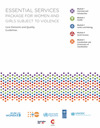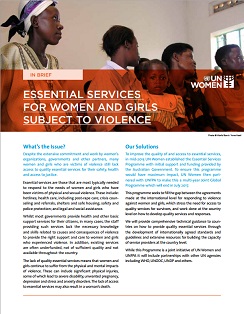Services for all women
Although progress is being made globally, many women and girls who experience physical and sexual violence still lack access to quality multi-sectoral services. These services are essential as they provide much-needed support to survivors of violence, by keeping them safe, providing health care for their injuries, responding to their sexual and reproductive health needs, including provision of post-rape care and counselling, and facilitating their access to the police and justice system. Particularly vulnerable groups—such as migrants, women living with disabilities, indigenous women or women living in remote areas—have even more limited options and often lack access to basic services.
Our Solutions
UN Women is working to improve the quality of, and increase accessibility to, coordinated services and responses to violence against women. We will work with partners to reach a shared understanding at the global level on the range of services and responses required and the corresponding standards and/or guidelines for the provision of the services that are considered essential to meet the needs of women and girls subjected to violence. This includes their access to police and justice, health-care and other support services. We are doing this through technical consultations with UN agencies, independent experts and practitioners.
UN Women also engages with national partners to advocate and help establish the core services that women must access in order to survive and recover from violence.
In Ethiopia, for example, UN Women has helped expand a network of safe houses in Adama and Addis Ababa that offer comprehensive health, legal, job-training and other forms of assistance to survivors. One house is situated in a police station, easing access for women reporting crimes. Another is dedicated to assisting Somali refugees through a referral system in the Dollo camps.
UN Women has also assisted with institutional capacity-building to make sure that the essential services provided to women subjected to violence are rights-based and gender-sensitive. Following a gender audit, the Ethiopian police force has improved criminal justice responses by revising its training programme to comprehensively integrate women’s rights and gender equality.
In Mexico, for example, support to the National Commission for the Development of Indigenous Peoples has contributed to scaling up a service model to respond to violence and improve sexual and reproductive health. It combines advocacy, awareness-raising, community counselling and legal advice. The model’s proven success in expanding women’s access to health care and justice convinced the Government to make it a national programme with an earmarked budget. Implemented through a network of Indigenous Women’s Houses, it now serves women in all 25 indigenous zones in Mexico, covering 871 municipalities.
In Haiti, UN Women has assisted a network of safe houses to offer counselling, medical services and legal assistance. Our support has helped train counsellors, and aided the Ministry for Women’s Condition and Rights in establishing standard operating procedures to ensure services are consistent and high in quality.
Extended paralegal services specifically targeted to survivors of domestic violence in the marginalized Roma communities of Bosnia and Herzegovina have led to a 50-per-cent increase in requests for help. Similarly, new free legal aid services provided by civil society organizations in the former Yugoslav Republic of Macedonia have spurred a 60-per-cent jump in the number of survivors seeking justice.



